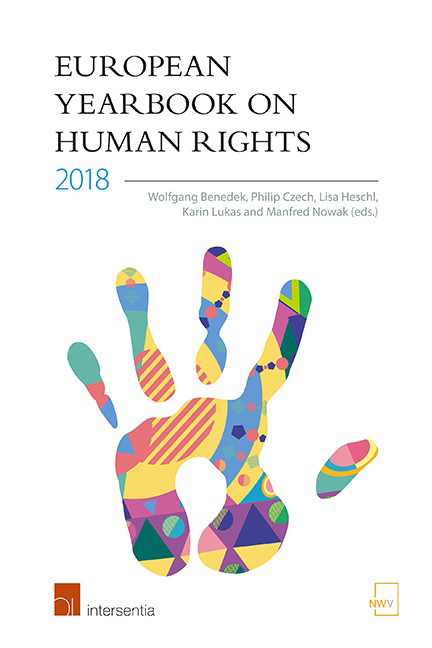Book contents
- Frontmatter
- Scientific Advisory Board
- Editors’ Preface
- Contents
- List of Abbreviations
- List of Contributors
- Part I Topic Of The Year
- Part II Eu
- Part III Coe
- PART IV OSCE
- Enhanced Structure and Geographical Balance: Reforming the OSCE's Human Dimension Meetings
- The Crisis of the International Protection of Human Rights and the Geopolitical OSCE Perspective: ‘The End of Human Rights’, ‘Shooting the Messenger’ or Strengthening Cooperation?
- How Multilateral Organisations can Communicate Better about Human Rights
- Rising Populism and its Impact on Women's Rights: Selected Cases from the OSCE Region
- The Impact of #MeToo on Women's Rights in the OSCE Region
- Part V Others
- Part VI Book Reviews
- Index
The Impact of #MeToo on Women's Rights in the OSCE Region
from PART IV - OSCE
Published online by Cambridge University Press: 31 January 2019
- Frontmatter
- Scientific Advisory Board
- Editors’ Preface
- Contents
- List of Abbreviations
- List of Contributors
- Part I Topic Of The Year
- Part II Eu
- Part III Coe
- PART IV OSCE
- Enhanced Structure and Geographical Balance: Reforming the OSCE's Human Dimension Meetings
- The Crisis of the International Protection of Human Rights and the Geopolitical OSCE Perspective: ‘The End of Human Rights’, ‘Shooting the Messenger’ or Strengthening Cooperation?
- How Multilateral Organisations can Communicate Better about Human Rights
- Rising Populism and its Impact on Women's Rights: Selected Cases from the OSCE Region
- The Impact of #MeToo on Women's Rights in the OSCE Region
- Part V Others
- Part VI Book Reviews
- Index
Summary
ABSTRACT
All across the region covered by the Organization for Security and Co-operation in Europe (OSCE) # MeToo sparked public debates about the abuse of power and sexual violence against women perpetuating gender inequality. These debates carried serious consequences on both individual and structural levels: powerful perpetrators were forced to resign and biased power structures were questioned. We argue that the campaign provides a perfect case to study how a digital social movement can give agency to the victims and impact the structural level. On basis of an extensive press coverage review of the # MeToo movement conducted in 12 languages and covering the period of six months between October 2017 and March 2018, complemented with legal and document reviews, we analyze the impact the # MeToo campaign has had on women’s human rights in the OSCE region, both de facto and de jure . We conclude that in many of the OSCE participating States a renewed push for ratification of the Istanbul Convention has been observed and five of them have ratified the treaty since the # MeToo movement started. Furthermore, several states are revising their laws on sexual harassment; many noted a sharpincrease in the number of cases of sexual assaults formally reported, and in some, there is already evidence of attitude change towards sexual harassment and sexism as an immediate result of the # MeToo movement. There is also evidence suggesting that # MeToo contributed to the current surge in numbers of women candidates running for elections in the US.
- Type
- Chapter
- Information
- European Yearbook on Human Rights 2018 , pp. 543 - 570Publisher: IntersentiaPrint publication year: 2018



